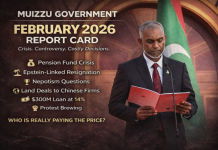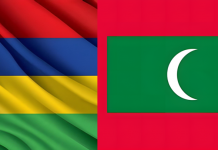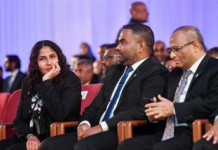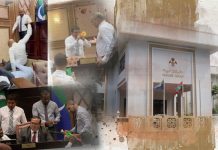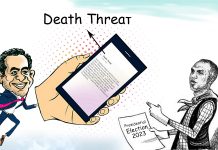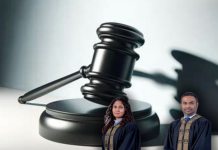IF YOU WERE to search Twitter for what people were saying about the Maldives on any given day, you would get two types of posts. On the one hand are pictures of the world’s wealthy sipping cocktails on palm fringed beaches, snorkelling in shimmering turquoise waters or lounging in underwater spas as colorful fish swim overhead. On the other are images of riot police gassing and beating protesters, and pleas from Maldivians for freedom for jailed dissidents, as well as demands for justice for attacks on bloggers and journalists.
These search results are a perfect example of the dual realities that mark the present day Maldives.
To holidaymakers, the Maldives is paradise – a place where one goes to retreat from the world. Indeed, upmarket hotels advertise the Indian Ocean archipelago as a “deserted idyll” and “unspoiled wilderness”, where guests can take off their shoes, switch off the news, “embrace tranquility” and “treat yourself to paradise”.
Those descriptions could not be further from the truth for ordinary Maldivians.
President Abdulla Yameen, who assumed power following a disputed election in 2013, has rolled back the country’s hard-won democratic gains; jailed, or forced into exile, nearly all opposition leaders; banned protests; shuttered newspapers; and, according to critics, allowed radical Islam to flourish.
Meanwhile, journalists based in the country say they are finding it increasingly difficult to report there. The “disappearance” of a journalist, the killing of a blogger, death threats, imprisonment and hefty fines are placing an enormous pressure on those who seek to inform the public about what is going on. The threats to safety, coupled with the government’s refusal to answer questions, has made reporting on topics such as corruption, rights abuses and growing Islamic extremism near-impossible.
Yet it is likely that the president may stand virtually unopposed as Maldivians head to the ballot box to elect a president in September this year.
How did we get here?
It began when the country’s first democratically elected president, Mohamed Nasheed, was ousted in 2012. Three years later, he was jailed on terrorism charges. The trial triggered mass protests, resulting in the arrest of hundreds of people, the prosecution of more opposition figures and a near-total ban on demonstrations and political rallies. Journalists, activists and lawyers reported receiving death threats and a journalist disappeared, but none of the cases was successfully investigated or prosecuted.
The next year, in 2016, a massive corruption scandal engulfed Yameen following revelations that his deputy coordinated the theft of more than US$79m in revenues from island sales.
Yameen denies the corruption allegations. Pleading ignorance, he blamed the embezzlement of state coffers on his vice-president, who he sacked and jailed on graft (political corruption for personal gain) and terrorism charges. As accusations of politicised trials piled up, judges moved to silence criticism by suspending lawyers en masse on contempt of court charges and barring journalists from the courts.
Meanwhile, parliament, where the ruling party holds a majority, passed a law criminalising speech that was defamatory or deemed a threat to national security and religious unity.
His popularity plunging, Yameen has styled himself as the sole defender of Islam in the Sunni-majority country, and labeled any foreign criticism as interference aimed at undermining Islam. He has pledged to end a six-decade moratorium on the death penalty and to crack down on what he calls antiIslamic speech.
When Yameen Rasheed, a young blogger who criticised authoritarianism and growing religious violence, was stabbed to death in April last year, the president condemned those who “insult Islam”, saying there were limits to free speech. The next month, the police placed three other bloggers, all of whom live abroad, under investigation on unspecified charges.
Taken together, critics say Yameen’s actions have resulted in a climate of fear that does not bode well for the prospect of free and fair elections.
Journalists, activists and dissidents say they face hefty fines, jail, assault and even death for criticising the president and his allies.
Hussain Fiyaz Moosa, the chief executive officer of Raajje TV, says the main tool used by the government to quash criticism is the Anti-Defamation Law passed in 2016. Since the law came into effect, the broadcast regulator has fined the opposition-aligned station MVR1.7m ($109,718), mainly for defaming the president.
In one instance, the station was punished when it aired a speech in which an opposition politician accused Yameen of failing to deliver on his development pledges.
“Over the space of three years, how many billions of rufiyaa have been handed to him from the state coffers? But nothing has been done. We have seen nothing but theft and corruption,” the remarks that caused offence read, according to Raajje TV.
Ironically, the politician responsible for the offensive remarks was not penalised. But Raajje TV was warned that it could face closure if it failed to pay the fine, forcing the station’s staff to canvass on the streets to raise the money needed.
“Because of these massive fines, we cannot invite certain guests on air or cover certain topics, including corruption, theft [or] misuse of state resources by senior officials of the state, especially President Yameen and his wife. Even when we have evidence,” said Fiyaz. This is not the station’s only worry. Raajje TV’s journalists are regularly subject to government harassment, including arrest and prosecution.
Meanwhile, suspects in a near-fatal attack on station anchor Ibrahim Asward Waheed, in 2012, and an arson attack that destroyed the station’s headquarters the following year are yet to be prosecuted.
“All of this has put us on the back foot,” said Fiyaz. “The government is using all means possible to shut us down … We have no protection.”
The government has also moved to silence criticism on social media. In March 2017, Shammoon Jaleel, an opposition supporter, fled the Maldives fearing persecution for criticising a planned government deal to lease a central atoll to Saudi Crown Prince Mohammed bin Salman, one of Yameen’s backers on the international stage. Jaleel, who has a following of more than 20,000 on Twitter, had already spent more than 40 days in jail the previous year for likening riot police to animals.
Jaleel says he left the Maldives after receiving death threats via Twitter and text messages.
“I was also getting calls and I was told I would be killed inside my own house. I was getting harassed on the streets by members of gangs. And then I was summoned to the police and my phone was confiscated on charges of inciting hate. That’s when I left,” the 29-year-old said.
Another activist, Thayyib Shaheem, who angered the government with leaks of sensitive plans, said that his phone number was disconnected and reassigned to a third party, who had changed the passwords of his social media account using the number. Later, it emerged that police had accessed the activist’s phone’s sim card through a court order. Shaheem now lives in exile in Sri Lanka.
“The government is pushing the image that the Maldives is a peaceful tourist destination, that it’s a young democracy undergoing a transition. But the ground reality could not be more different,” said Mariyam Shiuna, executive director at anti-corruption group Transparency Maldives.
“The future looks bleak. With serious doubts over the upcoming election, we are either heading to a long period of instability or a long period of authoritarianism.”

Zaheena Rasheed reports on the persecution that lies behind those pictures of perfect beaches.Former editor of the Maldives Independent . She is now at Al Jazeera
News Source- White sands, dark deeds


